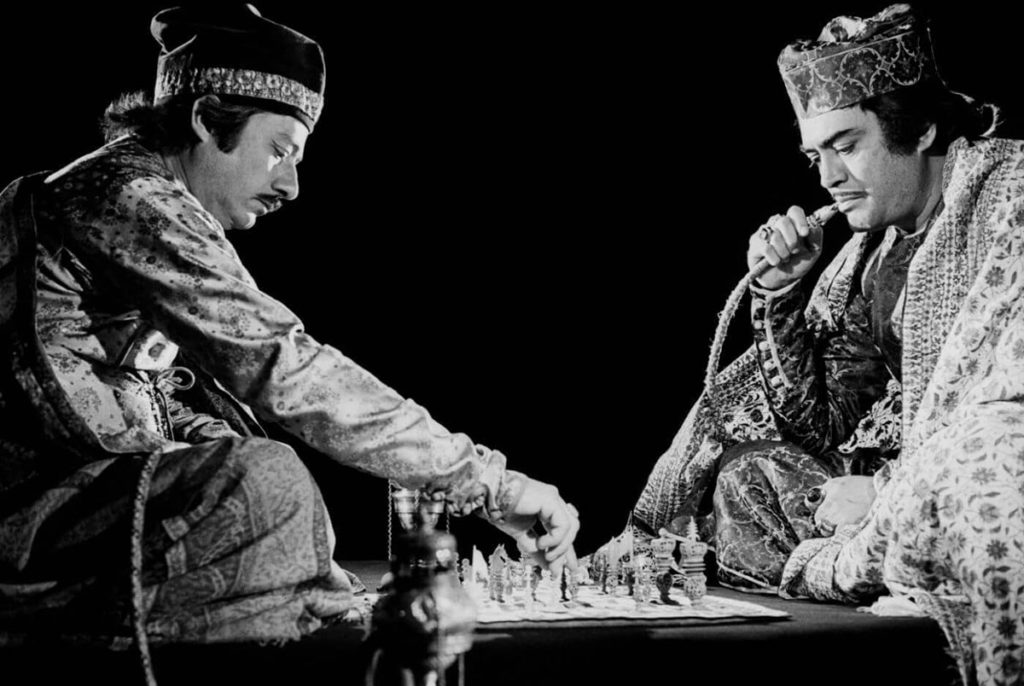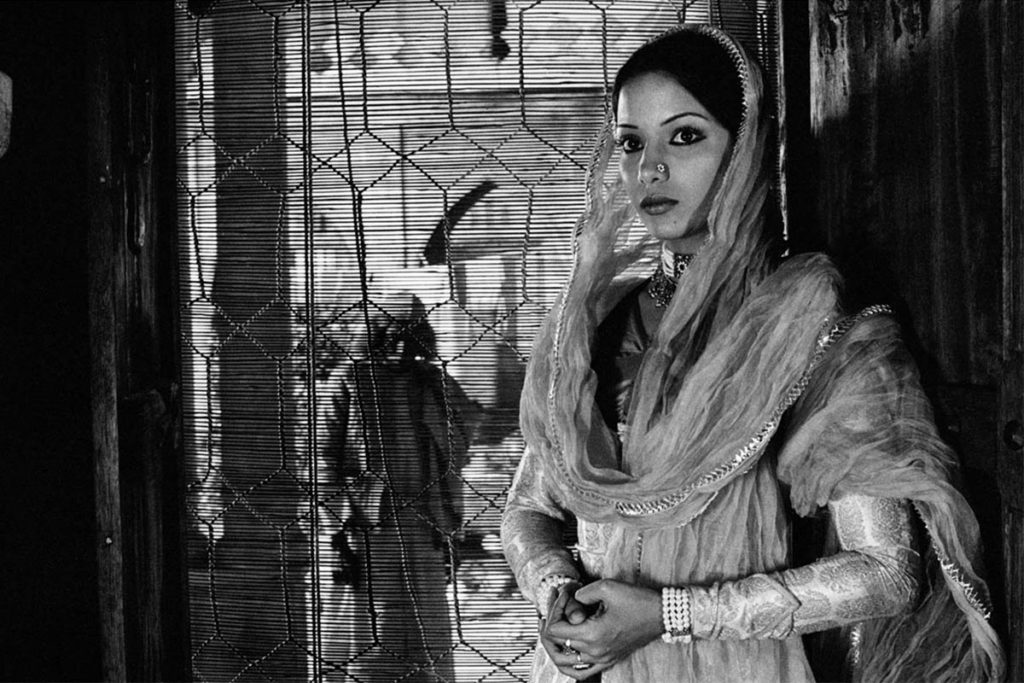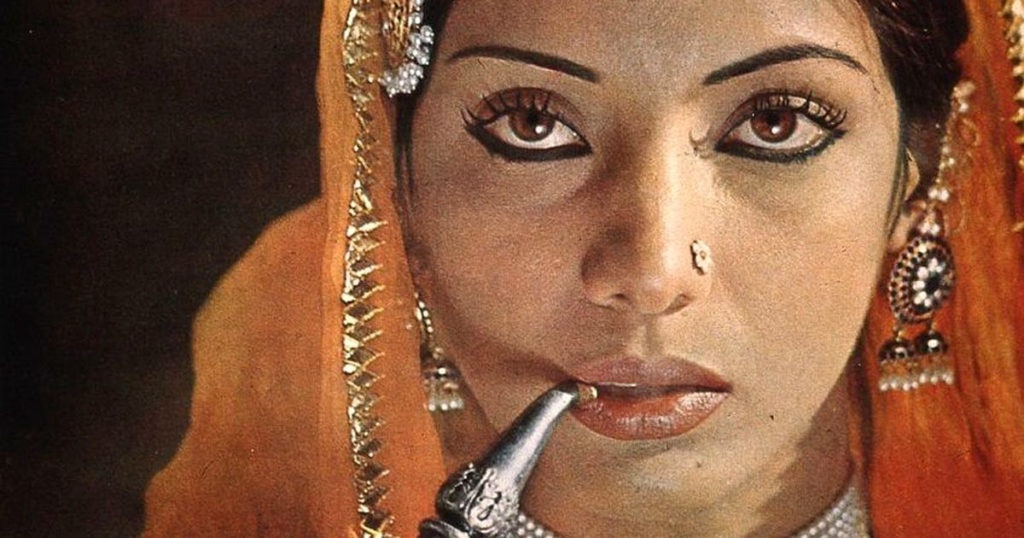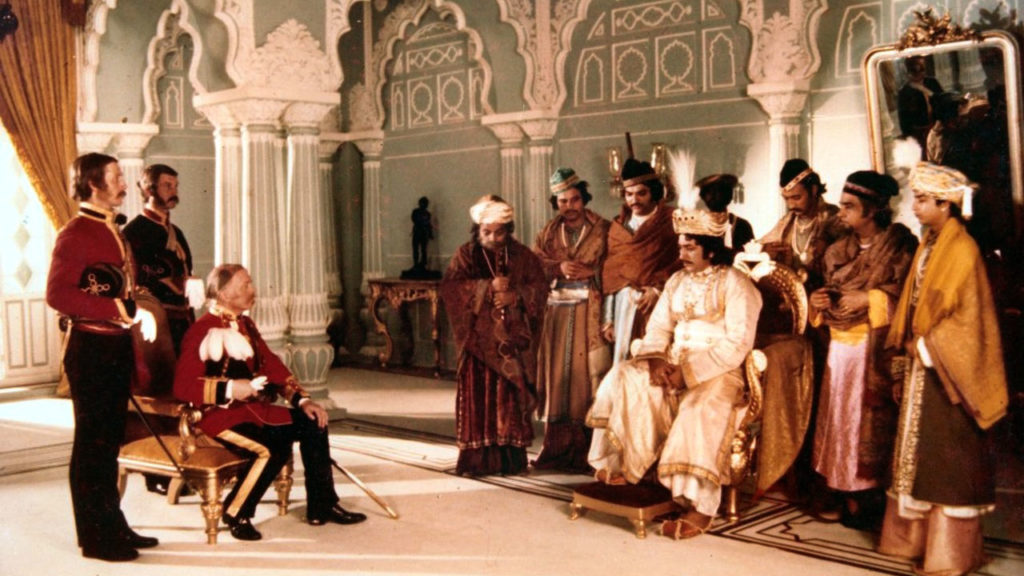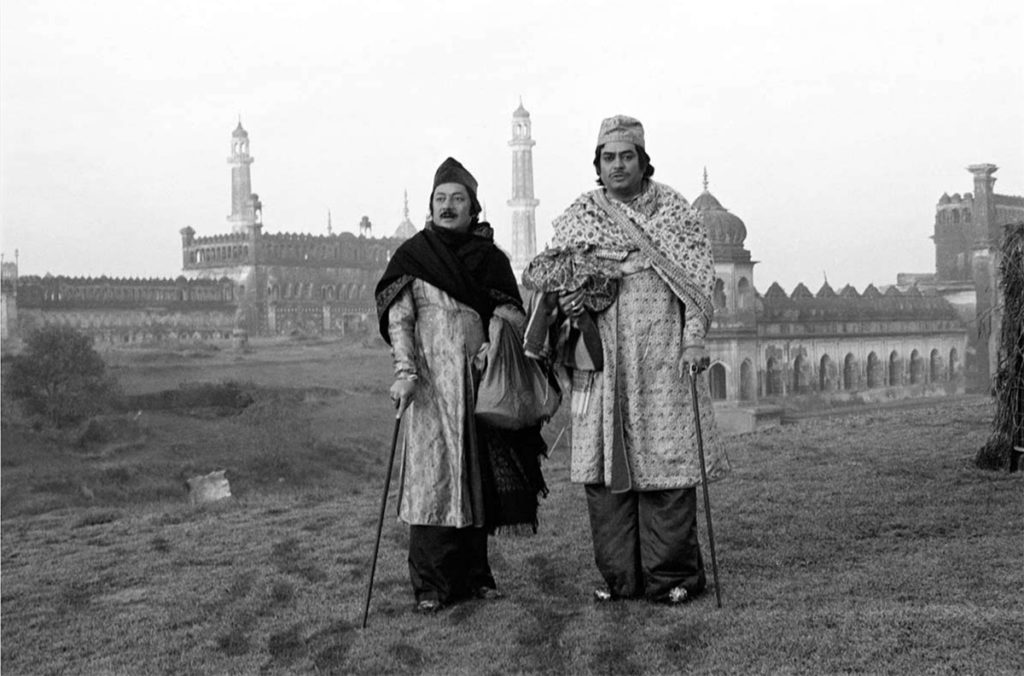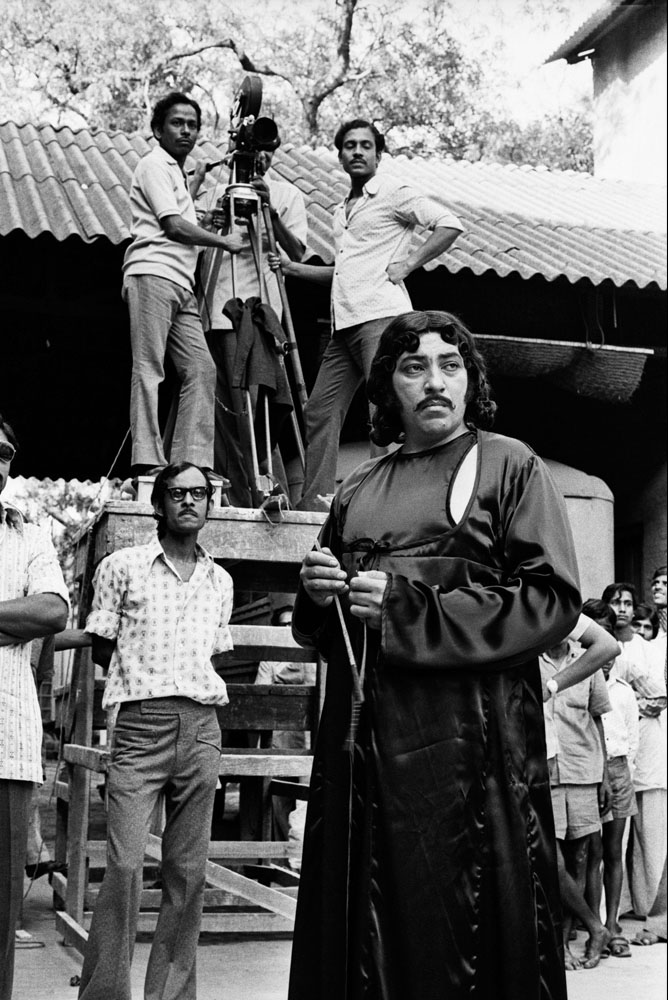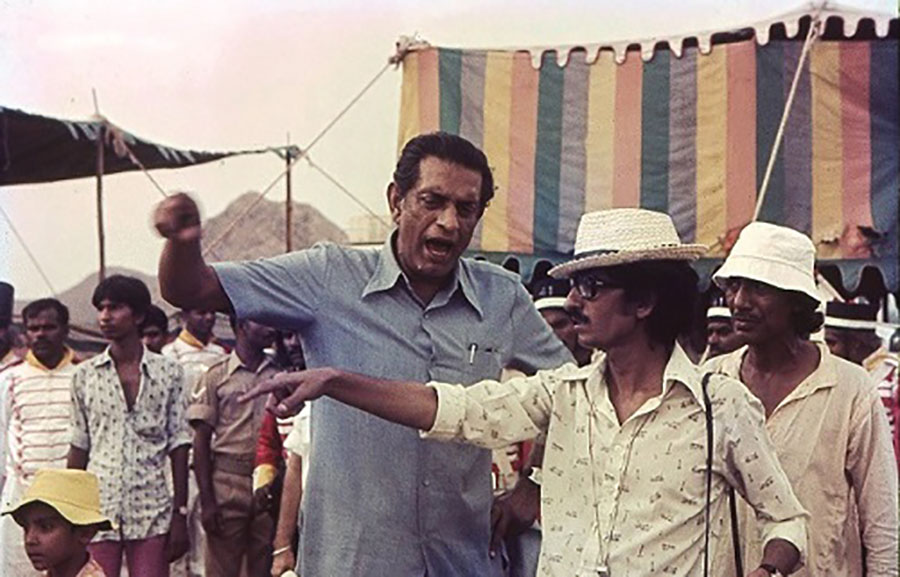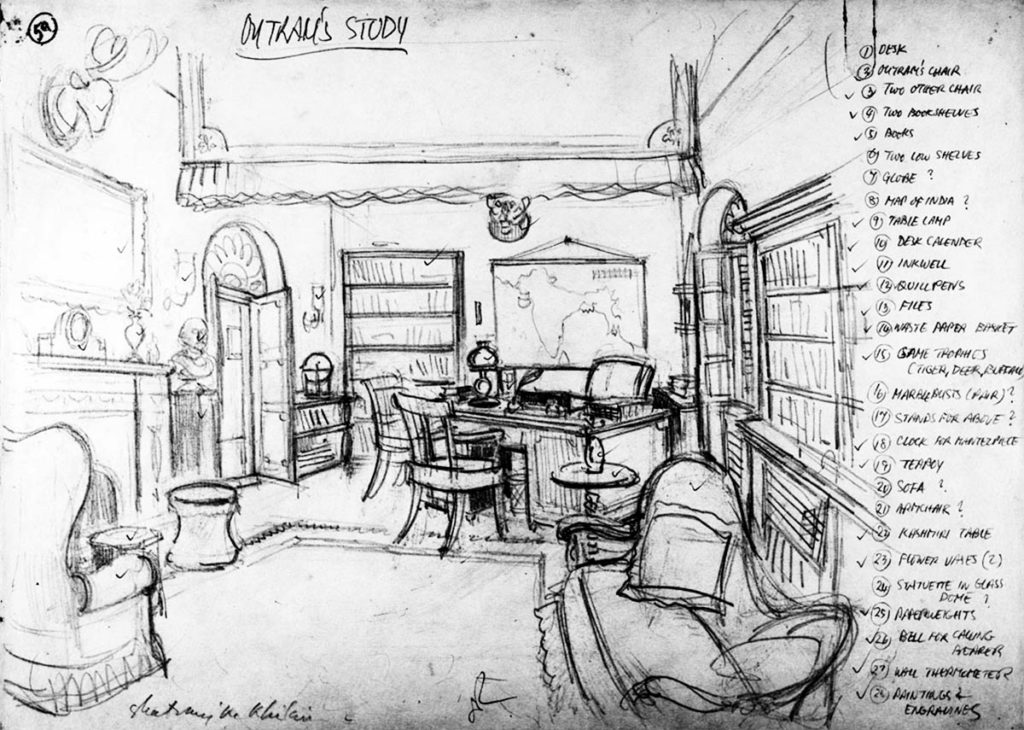Shatranj Ke Khilari (The Chess Players)
1977, India. 113 min., Color, Urdu/Hindi and English (The Indian characters speak in Urdu/Hindi while the British speak in English)
Summary
It is 1856, the eve of the first Indian struggle for independence (The Mutiny of 1857). A British firm, “The East India Company” rules much of India; directly or indirectly through ‘treaties of friendship.’The kingdom of Avadh is under such a treaty of friendship with the British Company. Its ruler, Nawab Wajid Ali Shah (Amjad Khan), is an indifferent ruler, who prefers arts to the matters of state or politics. He is a poet, composer, singer, dancer and a choreographer. In reality, he is merely a figurehead. The British Company has allowed the landlords to become fairly independent of the state. The Company, in addition to collecting the riches from the state, also takes a share of the taxes collected by the landlords.
The king’s able Prime Minister, Ali Naqi Khan (Victor Banerjee), is pained at the situation. But he does not do anything drastic due to his respect and loyalty to the king. Mirza Sajjad Ali (Sanjeev Kumar) and Mir Roshan Ali (Saeed Jaffrey) are two landlords living in the capital city of Lucknow. They too are part of the same culture and live off ancestral wealth and taxes collected from people. They do nothing, and are addicted to the game of chess. They play as per the ancient Indian rules of the game, ignorant of a different kind of chess played by the British; both literally and metaphorically. Mirza’s wife, Khurshid (Shabana Azmi), feels neglected. Mirza no longer responds to her feminine charms due to his obsession with chess. Mir’s wife, Nafeesa (Farida Jalal) too faces a similar fate. But she has found solace in a wild love affair with a young nephew. On discovering the affair, Mir opts to ignore it rather than confront the situation and disturb his routine of playing chess.
The British are strengthening their grip on the country and are playing a bigger game of chess. Lord Dalhousie, the Governor General, sends General Outram (Sir Richard Attenborough), the British Resident of Lucknow, to take over Avadh under the pretext of Nawab’s misrule.
The king, Wajid Ali Shah faces a political checkmate. He has only two options, either to give up his throne or to fight a battle. He has neither the will nor the means to fight the British, for he has a tiny and ill equipped army. The state has felt no need to maintain an army as the Avadh is under a ‘treaty of friendship’ with the British Company.
Mir and Mirza learn about the British Company’s troops marching towards Lucknow. Scared that they may be called to fight the British forces, they run off to a remote village to continue playing chess.
Fearing blood shedding of his people in a hopelessly unequal battle, the king opts to hand over the kingdom to the British with out a fight, singing to himself a Thumari that he has composed –
(Roughly translated: As we leave our beloved city of Lucknow, see what we have to go through…)
For Mir and Mirza, the chess continues even as the British troops march into the city until they have a fight over the game. Mir, who has nearly shot Mirza and is ashamed of his behavior, says, “We cannot even cope with our wives, so how can we cope with the company’s army?” .
Comments
Shatranj Ke Khilari was Ray’s most expensive film boasting of stars from western and Hindi cinema of Bombay. It was reported to have cost about two million rupees in comparison of his earlier films that were made under half a million rupees. This, however, was still a shoestring budget when compared with the average budgets of the contemporary Hindi films of Bombay, ranging from 4 to 10 million rupees. It is also his one of the two non-Bengali films; other being Sadgati (Deliverance) also based on a short story by Munshi Premchand.
While Munshi Premchand’s story focuses on the two chess players Mirza and Mir, Ray expanded the story by elaborating the characters of Wajid Ali Shah and General Outram and adding a few more characters. Ray was attracted to the story by the parallel that Munshi Premchand draws between chess games of Mir and Mirza, and the crafty moves by the British to capture the king.
The film has no heroes or villains. Like in most of his films, he sympathizes with better attributes of both the British and the King, Wajid Ali Shah. General Outram is troubled with the illegal means he must follow to take over Avadh despite a treaty of friendship with the kingdom. But he feels bound by his duty to the British Empire. The King, Wajid Ali Shah, is shown as an accomplished poet, musician and choreographer with no interest in political matters. He has relied on the treaty of friendship with the British to pursue the arts in stead of maintaining an army.
It is interesting to note that the film was made during the darkest period of modern Indian democracy when the Prime Minister, Indira Gandhi declared “Emergency” from 1975 to 1977, and suppressed the fundamental rights for her political survival. This was made possible by her crafty moves and initial noninvolvement by people; like Mir and Mirza in the film.
All the lead players, Sanjeev Kumar (Mirza Sajjad Ali), Saeed Jaffrey (Mir Roshan Ali), Amjad Khan (Wajid Ali Shah, Nawab), Victor Banerjee (Ali Naqi Khan, the Prime Minister) and Sir Richard Attenborough (General Outram) give their finest performances.
The non Bengali audience also gets to appreciate Ray’s dialogue writing skills in a few scene that are in English, though the Urdu dialogues that were written by collaborators do not rise to the same standards. A scene that takes place between General Outram (Sir Richard Attenborough) and Captain Weston (Tom Alter) prompted V. S. Naipaul to comment, “It’s like a Shakespeare scene. Only three hundred words (actually over 500 words) are spoken but goodness! – terrific things happen.” Here is an excerpt from ‘The chess players : and other screenplays’ :
Outram: Tell me, Weston, you know the language, you know the people here- I mean, what kind of a poet is the King? Is he any good, or is it simply because he’s the king they say he’s good?
Weston: I think he’s rather good, Sir.
Outram: You do, eh?
Weston: Yes, Sir.
Outram: Do you know any of his stuff?
Weston: I know some, Sir.
Outram: Well, can you recite it? Do you know it by heart?
Weston: (taken aback): Recite it, Sir?
Outram: Yes, I’m not a poetry man. Many soldiers are. But I’m curious to know what it sounds like. I rather like the sound of Hindustani.
(Weston remains silent, slightly ill at ease.)
Outram: Are they long, these poems?
Weston: Not the ones I know, Sir.
Outram: Well, go on man, out with it!
(Weston recites a four-line poem.)
Outram: Is that all?
Weston: That’s all, Sir.
Outram: Well, it certainly has the virtue of brevity. What the hell does it mean, if anything?
Weston: He’s speaking about himself, Sir.
Outram: Well what’s he saying? It’s nothing obscene, I hope?
Weston: No, Sir.
Outram: Well, what’s he saying?
Weston (coughing lightly):
Wound not my bleeding body.
Throw flowers gently on my grave.
Though mingled with the earth, I rose up to the skies.
People mistook my rising dust for the heavens.
That’s all, Sir.
Outram: H’m. Doesn’t strike me as a great flight of fancy, I’m afraid.
(Outram rises from his chair slowly.)
Weston: It doesn’t translate very well, Sir.
Outram: And what about his songs? He’s something of a composer, I understand? Are they any good, these songs?
Weston: They keep running in your head, Sir. I find them quite attractive. Some of them.
Outram: I see.
Weston: He’s really quite gifted, Sir.
(Outram glances briefly at Weston and begins to pace the room thoughtfully.)
Weston: He’s also fond of dancing, Sir.
Outram: Yes, so I understand. With bells on his feet, like nautch girls. Also dresses up as a Hindu god, I’m told.
Weston: You’re right, Sir. He also composes his own operas.
Outram: Doesn’t leave him much time for his concubines, not to speak of the affairs of state. Does he really have 400 concubines?
Weston: I believe that’s the count, Sir.
Outram: And 29 ‘muta’ wives. What the hell are muta wives?
Weston: Muta wives, Sir. They’re temporary wives.
Outram: Temporary wives?
Weston: Yes, Sir. A muta marriage can last for there days, or three months, or three years. Muta is an Arabic word.
Outram: And it means temporary?
Weston: No, Sir.
(Outram raises his eyebrows.)
Outram: No?
Weston: It means-er, enjoyment.
Outram: Oh. Oh yes I see. Most instructive. And what kind of a king do you think all this makes him, Weston? All these various accomplishments?
Weston (smiling): Rather a special kind, Sir, I should think.
(Outram stops pacing, stiffens, turns sharply to Weston.)
Outram: Special? I would’ve used a much stronger word than that,
Weston: I’d have said a bad king. A frivolous, effeminate, irresponsible, worthless king.
Weston: He’s not the first eccentric in the line-
Outram (interrupting): Oh I know he’s not the first, but he certainly deserves to be the last. We’ve put up with this nonsense long enough. Eunuchs, fiddlers, nautch-girls and ‘muta’ wives and God knows what else. He can’t rule, he has no wish to rule, and therefore he has no business to rule.
Weston: There I would agree with you, Sir.
Outram: Good. I am glad to hear that. I have it in mind to recommend you for a higher position when we take over-
Weston: Take over, Sir?
Outram: Take over, Weston. And any suspicion that you hold a brief for the King would ruin your chances. You remember that.
©Ray Family. Ray, Satyajit. The chess players : and other screenplays. Edited by Andrew Robinson. London, Faber, 1989. ISBN 0571140742.
Awards
- Best Feature Film in Hindi, New Delhi, 1977
- Best Color Photography, New Delhi, 1977
Credits | |
| Producer: | Devki Chitra Productions (Suresh Jindal) |
| Screenplay & Direction: | Satyajit Ray, Based on the short story: ‘Shatranj Ke Khilari’ by Munshi Premchand |
| Dialogues: | Satyajit Ray, Shama Zaidi, Javed Siddiqi |
| Cinematography: | Soumendu Roy |
| Editing: | Dulal Dutta |
| Art Direction: | Bansi Chandragupta & Ashoke Bose |
| Sound: | Narinder Singh, Samir Majumdar |
| Music: | Satyajit Ray |
| Choreography: | Birju Maharaj |
Cast | |
| Character: | Performer |
| Mirza Sajjad Ali: | Sanjeev Kumar |
| Khurshid, Mirza’s wife: | Shabana Azmi |
| Mir Roshan Ali: | Saeed Jaffrey |
| Nafeesa, Mir’s wife: | Farida Jalal |
| Wajid Ali Shah, Nawab (king): | Amjad Khan |
| Ali Naqi Khan, the prime minister: | Victor Bannerjee |
| General Outram: | Sir Richard Attenborough |
| Captain Weston: | Tom Alter |
